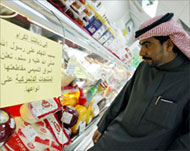Boycott costing Danish business dear
Consumer boycotts of Danish goods in Muslim countries in protest at publication of caricatures of the Prophet Muhammad are costing Denmark’s companies millions, and has raised fears of irreparable damage to trade ties.

From Havarti cheese to Lego, Danish products have been yanked off the shelves of stores in Saudi Arabia, Kuwait and other countries around the Middle East as Muslims await an apology for the cartoons, which the Copenhagen government has said it cannot give.
The boycotts began in Saudi Arabia on 26 January when supermarkets either put up signs saying to stop buying Danish goods or removed products from shelves. Since then it has spread to other Muslim nations, and even to Western stores doing business there.
A supermarket in Cairo run by France‘s Carrefour has had signs, for example, saying that it is not offering Danish products “in solidarity with Muslims and Egyptians.“
Carrefour said the store was a franchise run by a local company.
Carrefour said it is “strictly neutral” but “stores operated by our partners or franchises are free to make commercial decisions according to the local situations“.
Indonesia‘s importers association on Wednesday began boycotting Danish goods, which it said made up $74 million (€ 62 million) in 2005, about 1% of the nation’s annual imports.
Serious call
In Syria, banners on walls and storefronts all call for consumers to avoid Danish products.
“It’s a situation that causes a great concern from our members,” said Henriette Soltoft, director of international market policy for the Confederation of Danish
Industries.
|
|
|
Danish firms are worried about |
“There’s also the fear (for the future) … that the consumer will not remember exactly what happened, but they will remember the connection to Denmark,” she said, noting that the Middle East is seen as a growth area.
“Our good relations with these countries have been damaged but we do not know yet to what extent – that we’ll see in the future and it will depend on how soon this crisis will be solved and how it will be solved.“
The drawings published by newspaper Jyllands-Posten in September have sparked protests, sometimes violent, in Muslim countries. Islam widely holds that representations of Muhammad are banned for fear they could lead to idolatry.
Common position
Manushehr Mottaki, Iran’s foreign minister, reiterated a common position on Thursday, saying on a visit to Lebanon that “in order for the Danish government to mend its relations with the Islamic world and Muslim peoples, it should issue a formal apology“.
Anders Fogh Rasmussen, the Danish prime minister, has repeatedly rejected such demands, saying the government cannot be held responsible for the actions of an independent newspaper.
 |
|
Denmark cannot take action if |
The paper itself has apologized for offending Muslims, but has stood by its decision to print the drawings, citing the freedom of speech.
Peter Mandelson, the EU trade commissioner, has warned governments that if they are behind the boycotts that they could face action at the WTO if the EU proves they are involved.
If the boycotts are purely consumer-driven, however, little can be done.
Denmark‘s Danske Bank estimates Danish goods worth 10 billion kroner (€ 6.3 billion; $1.6 billion) annually are threatened in 20 Muslim countries by the boycott.
Denmark‘s overall 2004 exports totalled 452 billion kroner, or about $73 billion.
Damage
But Soltoft cautioned that the damage goes beyond exports, extending to service contracts, shipping and production facilities in the area – losses that cannot yet be
quantified.
“It’s really difficult to give an exact picture of the situation for the time being,” she said.
|
“We have sympathy for Muslims over this issue and we encourage a dialogue between the parties” Jacob Mikkelsen, |
Arla Foods, one of Europe‘s largest dairy companies, is thought to be the worst hit. Jacob Mikkelsen, the company’s manager for the United Arab Emirates and Oman, said it has lost an estimated $1.36 million each day of the boycott.
“We have sympathy for Muslims over this issue and we encourage a dialogue between the parties,“ he said, also calling on the government to issue a formal apology over the issue.
Arla, which draws some 6% of its revenues from the Arab Gulf states, employs about 1500 people in the region.
Mikkelsen warned the company may have to start laying off workers if the boycott continued.
